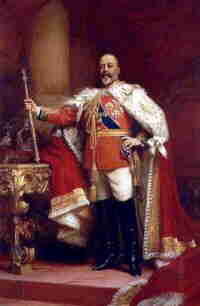 SKC Films Library SKC Films Library |
| SKC Films Library >> General and Old World History >> Great Britain >> England >> 20th Century |
 Edward
VII Edward
VIIKing of the United Kingdom of Great Britain and Ireland, 1901-1910 Albert Edward was born at Buckingham Palace on November 9, 1841, the second child and oldest son of Queen Victoria and Prince Albert. He was created Prince of Wales and Earl of Chester on December 4, 1841, and made a Knight of the Garter in November 1858. He was educated by tutors, and then studied industrial chemistry at Edinburgh, Christ Church, Oxford, and Trinity College, Cambridge; he completed his studies in 1861. Edward's "official" duties began in 1863, when he was sworn of the Privy Council and took his seat in the House of Lords as the Duke of Cornwall. The estate of Sandringham, at Norfolk, was purchased for him out of his personal savings, and his town residence was fixed at Marlborough House. On March 10, 1863, Edward married Princess Alexandra, daughter of King Christian IX of Denmark. Parliament then granted him an income of £40,000 a year, exclusive of revenues of the Duchy of Cornwall. The couple had six children, one of which died at birth -- Prince Albert Victor (born January 8, 1864), Duke of Clarence; Prince George Frederick Ernest Albert (born June 3, 1865), Duke of York; Princess Louise Victoria Alexandra Dagmar (born February 20, 1867), who became Duchess of Fife, Princess Royal, by marriage; Princess Victoria Alexandra Olga Mary (born July 6, 1868); Princess Maud Charlotte Mary Victoria (born November 26, 1869), who subsequently became Queen of Norway; and, John (born and died April 6, 1871). Heir Apparent Prince Edward spent most of his life waiting to become king. Although he undertook numerous public duties, he was excluded by Queen Victoria from acting as her legal deputy until 1898. He did, however, serve as her representative at public gatherings during her long period of mourning following the death of Prince Albert. Edward's public duties included working on the Royal Commission on Housing. He attended the opening of the Thames Embankment in 1871 and of the Mersey Tunnel in 1886, and laid the first stone of the Tower Bridge in 1894. A patron of the arts and sciences, Edward helped found the Royal College of Music and served as president of the Royal Society of Arts. He became the first chancellor of the University of Wales in 1896, and established the Prince of Wales's (afterwards King Edward's) Hospital Fund in 1897. Prince Edward also acted as Queen Victoria's representative overseas. He spent several weeks in India in 1875 and 1876, during which time he met with most of the provincial princes. His visit greatly improved relations between Britain and India, and led to Queen Victoria assuming the title Empress of India in 1877. His visit to Ireland in 1885 helped postpone a conflict between Britain and Ireland that had seemed inevitable for centuries. Edward also made official visits to Russia, France, Germany, and the United States during the years prior to his assuming the throne. King of the United Kingdom of Great Britain and Ireland Prince Edward became king upon the death of Queen Victoria on January 22, 1901, after having served the longest period as heir apparent in British history. A few months after his ascendancy, Parliament passed an act giving him the title "Edward VII, by the grace of God, of the United Kingdom of Great Britain and Ireland, and of all the British Dominions beyond the Seas, King, Defender of the Faith, Emperor of India." The date of King Edward's coronation was initially set for June 26, 1902, but had to be postponed when he was stricken with perityphlitis on June 24. Emergency surgery had to be performed, and, for a time, it looked as if he might succumb before he could be crowned. Fortunately, however, Edward made a full recovery, and he was formally crowned on August 9; his coronation was officially proclaimed in India on January 1, 1903. Fluent in French and German, King Edward made several trips abroad. Although he never presumed to carry more than a ceremonial title during these trips, he was often able to use his visits to improve relations between Britain and other nations. This ability was made even easier by the fact that he was in one way or another related to nearly every European sovereign. In fact, he was often lovingly referred to as the "Uncle of Europe." As his mother had before him, King Edward insisted on being kept informed of goings on in Parliament, and of being allowed to give advice on matters in which he was interested. In 1909, he found himself drawn into the constitutional crisis brought about by the refusal of the Conservative majority in the House of Lords to pass the budget bill proposed by the Liberal government. Although his legal powers were limited, King Edward did whatever he could to help resolve the crisis, but died before it was resolved. King Edward VII died at Buckingham Palace on May 6, 1910, and was buried in St. George's Chapel, Windsor. He was succeeded by his second son, George Frederick, who was crowned as King George V. INTERNET SOURCE SEE ALSO |
| SKC Films Library >> General and Old
World History >> Great Britain >> England >> 20th Century This page was last updated on June 22, 2017. |